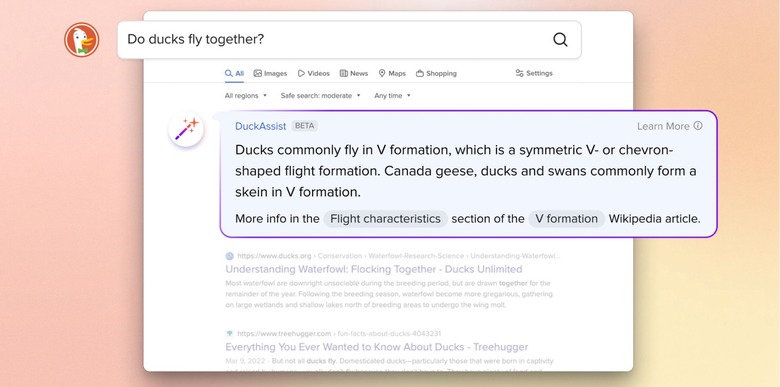DuckDuckGo's DuckAssist Feature Gets ChatGPT-Powered AI Upgrade
Today, DuckDuckGo announced it's enhancing its Private Search by adding its own Artificial Intelligence engine powered by ChatGPT. Called DuckAssist, the AI generates natural language answers to search queries using Wikipedia. In a blog post, the company says DuckAssist is the first in a series of AI-assisted private search and browser updates. Not only is it free to use, but also available with DuckDuckGo browsers and extensions.
Today, we're giving all users of DuckDuckGo's browsing apps and browser extensions the first public look at DuckAssist, a new beta Instant Answer in our search results. If you enter a question that can be answered by Wikipedia into our search box, DuckAssist may appear and use AI natural language technology to anonymously generate a brief, sourced summary of what it finds in Wikipedia — right above our regular private search results. It's completely free and private itself, with no sign-up required, and it's available right now.
If the beta testing goes right, then the company plans to release this AI-powered search engine to users in the coming weeks.
As the blog post explains, DuckAssist is a new type of Instant Answer in DuckDuckGo's search results, just like News, Maps, Weathers, and others. This feature was designed to be fully integrated with the company's Private Search while bringing AI-generated content. That said, the developers expect DuckAssist to feel "second nature."
DuckAssist answers questions by scanning specific sources (currently from Wikipedia and occasionally related sites like Britannica) using the browser's active indexing. By using ChatGPT natural language technology from OpenAI and Athropic to summarize what it finds, the answers should be "more directly responsive to your actual question than traditional search results or other Instant Answers."
DuckDuckGo says people shouldn't expect to see DuckAssistant on "many of your searches yet," but it will continue to evolve over time.
Nonetheless, DuckAssist won't generate accurate answers all of the time. We fully expect it to make mistakes. Because there's a limit to the amount of information the feature can summarize, we use the specific sentences in Wikipedia we think are the most relevant; inaccuracies can happen if our relevancy function is off, unintentionally omitting key sentences, or if there's an underlying error in the source material given. DuckAssist may also make mistakes when answering especially complex questions, simply because it would be difficult for any tool to summarize answers in those instances. That's why it's so important for our users to share feedback during this beta phase: there's an anonymous feedback link next to all DuckAssist answers where you can let us know about any problems, so we can identify where things aren't working well and take quick steps to make improvements.
You can learn more about DuckDuckGo's new AI-powered search engine here.
Update: The title of this article has been updated to correct an error that referred to DuckAssist as a search engine.
